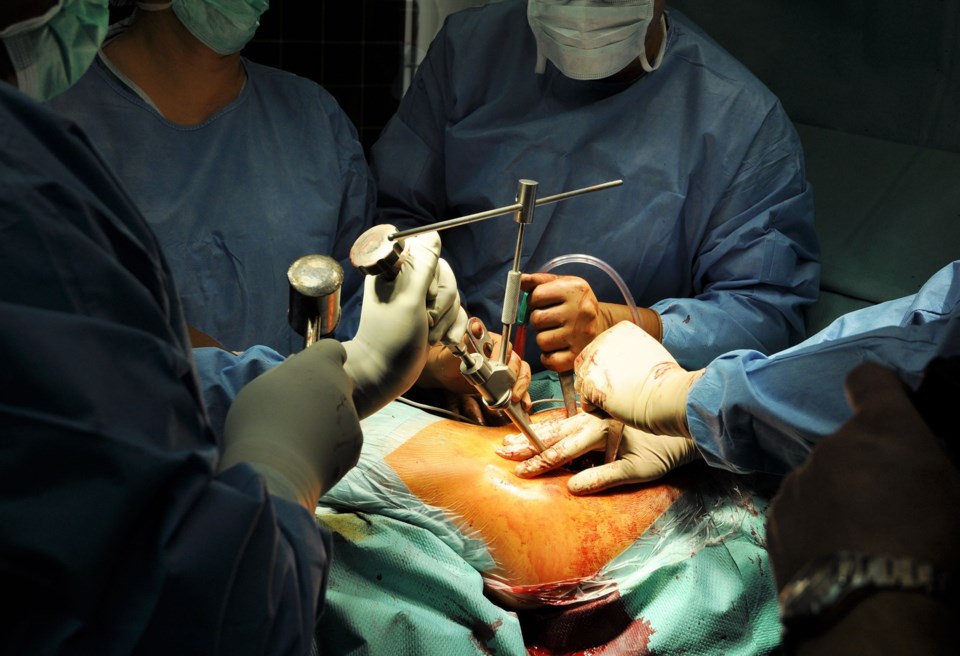New data released by the Canadian Institute for Health Information shows more patients are receiving select surgeries during a benchmark period.
But still, 30 per cent of patients that required a hip or knee replacement or cataract did not have their procedure done within the recommended wait times last year.
The benchmark is the time health practitioners aim to complete operations which is usually 26 weeks (182 days) for hip replacement and knee replacement surgeries. This is the number of days a patient waited, from the booking date to the date the patient received a planned total hip replacement.
Here in the Northern Health authority, the data suggests more are receiving surgeries within the benchmark period over the past four years. There has been some improvement inside B.C. while the national numbers are roughly the same.
British Columbia is one of only three provinces (along with Newfoundland and Labrador and Nova Scotia) to improve by five per cent since 2016.
For hip replacements specifically for the Northern Health Authority, 50 per cent of patients are treated within 118 days while 90 per cent are treated within 256 in based on numbers from 2014 to 2018. Both surgeries have seen higher completions since 2017.
Here are the following percentages that have been treated within the benchmark since 2014 for hip replacements:
- 2014: 76 per cent
- 2015: 79 per cent
- 2016: 54 per cent
- 2017: 57 per cent
- 2018: 69 per cent
Knee replacements have seen a fairly high percentage completed, except for 2016 and 2017, according to the statistics:
- 2014: 72 per cent
- 2015: 63 per cent
- 2016: 48 per cent
- 2017: 36 per cent
- 2018: 64 per cent
The data for British Columbia as a whole shows some low numbers for select surgeries while others have a higher completion in the benchmark time.
Fifty per cent of patients are treated within 120 days for hip replacements while 90 per cent received treatment within 321.
- 2014: 67 per cent
- 2015: 61 per cent
- 2016: 61 per cent
- 2017: 62 per cent
- 2018: 67 per cent
Knee replacements have a lower rate of completion within the benchmark period compared to hips. Fifty per cent are treated within 152 days while 90 per cent has to wait 358 days last year.
- 2014: 57 per cent
- 2015: 47 per cent
- 2016: 47 per cent
- 2017: 46 per cent
- 2018: 59 per cent
Canada has fairly high numbers when it comes to meeting the benchmarks. Fifty per cent of patients are treated in 105 days while 90 per cent are waiting 275 days for a hip replacement. Benchmark percentages haven't dropped below 75 per cent over the last four years.
- 2014: 82 per cent
- 2015: 81 per cent
- 2016: 78 per cent
- 2017: 76 per cent
- 2018: 75 per cent
Knee replacements in Canada have taken a bit longer. Fifty per cent are treated within 122 days while 90 per cent are left waiting for 317 days. The percentage has actually been trending downwards since 2014.
- 2014: 78 per cent
- 2015: 77 per cent
- 2016: 72 per cent
- 2017: 68 per cent
- 2018: 69 per cent
“Differences in wait times across the country are a reflection of multiple factors, including how care delivery is structured, how a patient’s wait time is measured and — most importantly, in hip and knee replacements — whether provinces are able to provide adequate resources to meet the demand for these types of surgeries,” says Dr. Eric Bohm, orthopedic surgeon and Canadian Joint Replacement Registry advisory committee chair.



